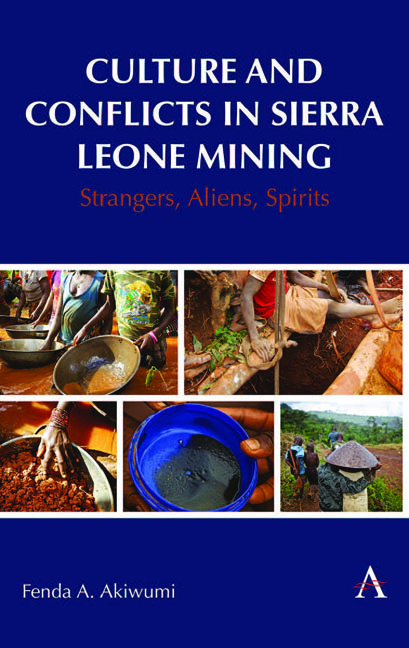Book contents
- Frontmatter
- Dediation
- Contents
- List of Figures and Tables
- Acknowledgements
- Abbreviations
- 1 Introduction: Culture in Commodity Chains
- 2 Sierra Leone’s Global Incorporation Through Mining
- 3 Cultural Difference: Policy and Legislative Dilemmas
- 4 Sacred Places: Local Ontology Meets Global Capital
- 5 Strangers, Environment, and Livelihoods
- 6 Race, Ethnicity, Class, and Gender in Mining
- 7 Between a Rock and a Hard Place
- 8 Conclusion
- References
- Index
3 - Cultural Difference: Policy and Legislative Dilemmas
Published online by Cambridge University Press: 13 April 2024
- Frontmatter
- Dediation
- Contents
- List of Figures and Tables
- Acknowledgements
- Abbreviations
- 1 Introduction: Culture in Commodity Chains
- 2 Sierra Leone’s Global Incorporation Through Mining
- 3 Cultural Difference: Policy and Legislative Dilemmas
- 4 Sacred Places: Local Ontology Meets Global Capital
- 5 Strangers, Environment, and Livelihoods
- 6 Race, Ethnicity, Class, and Gender in Mining
- 7 Between a Rock and a Hard Place
- 8 Conclusion
- References
- Index
Summary
This is the price paid for winning the country's wealth. To the European mine manager—himself often of working-class origin—it seems no special problem. As he sees matters, if the country is to get on, if things are to be made “efficient”, then the tribal system with its traditional outlook on land and obligation to the community, must go. (Lewis 1954, 200)
Addressing cultural conflict over land management in ordinances dates back to the nineteenth-century timber trade in Sierra Leone. Traders who rampantly exploited forest resources were strangers, Europeans, and Creole descendants of formerly enslaved people resettled in the Colony of Sierra Leone centered around Freetown. The Creoles although ethnic African were classified by the government as British subjects. As wealthy and influential strangers, they often appropriated landlord-indigenes’ customary rights and authority over land management. Chiefs responded to this injustice in traditional ways by imposing poro sanctions that prohibited laborers from, for instance, moving timber logs. Great Britain's response was to establish the Sierra Leone Protectorate by Ordinance to control trade in valuable commodities like timber and to acquire additional lands for extraction (Fyfe 1962).
John Hargreaves (1956, 70) explained that “the most drastic intervention from London with respect to the Protectorate Ordinance of 1897 was on the lands question.” One of its provisions overtly prohibited the use of poro sanctions to govern resources, a method that had been used for centuries. Another provision vested all mineral rights in the Crown. Further, under the ordinance, the Governor had the power to grant land rights to nonnatives or strangers. In contrast, customary law states that land which comprises “the surface soil and things found naturally under, on or above the surface, such as minerals and wild plants and trees. Man-made structures and cultivated crops are distinct from the land itself. The land is inalienable. Heads of landlord-indigene families are responsible for distributing any benefits accruing from land which in mining lease areas include surface rent payments stipulated in statutory law” (Renner-Thomas 2010, 177).
Ordinances also allowed the Governor to dispose of perceived waste and uninhabited lands.
- Type
- Chapter
- Information
- Culture and Conflicts in Sierra Leone MiningStrangers, Aliens, Spirits, pp. 35 - 62Publisher: Anthem PressPrint publication year: 2024

